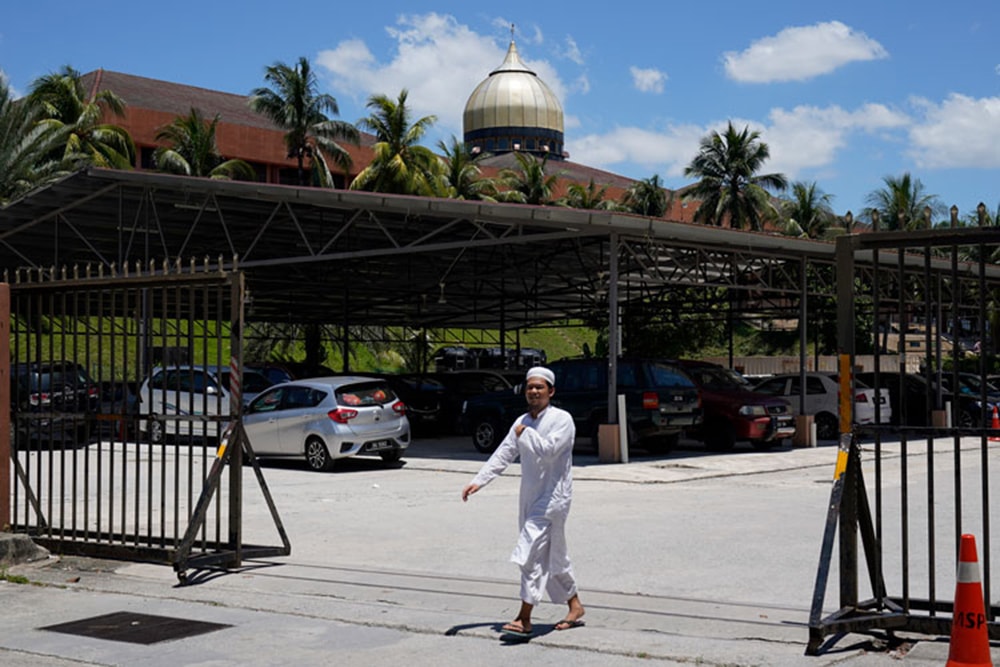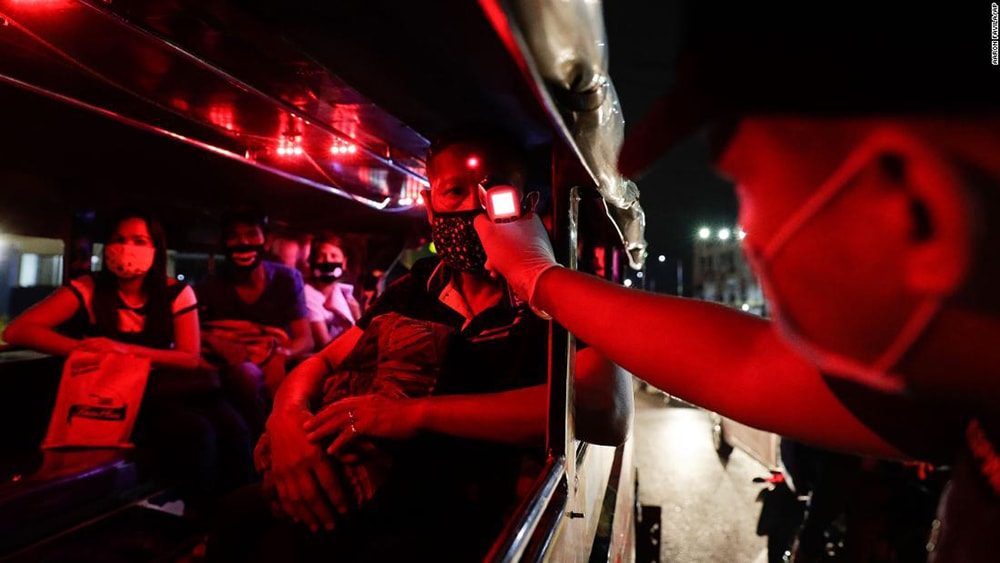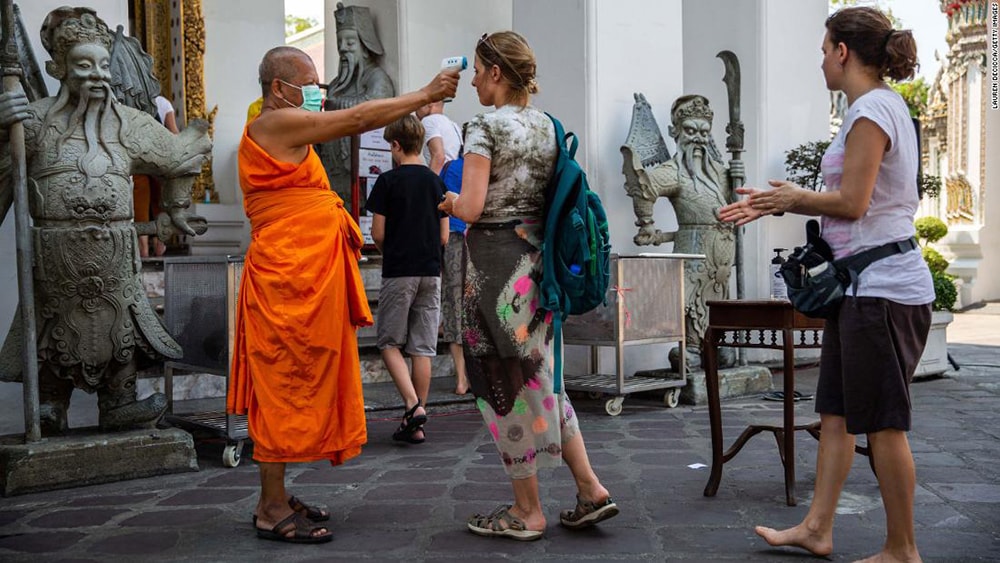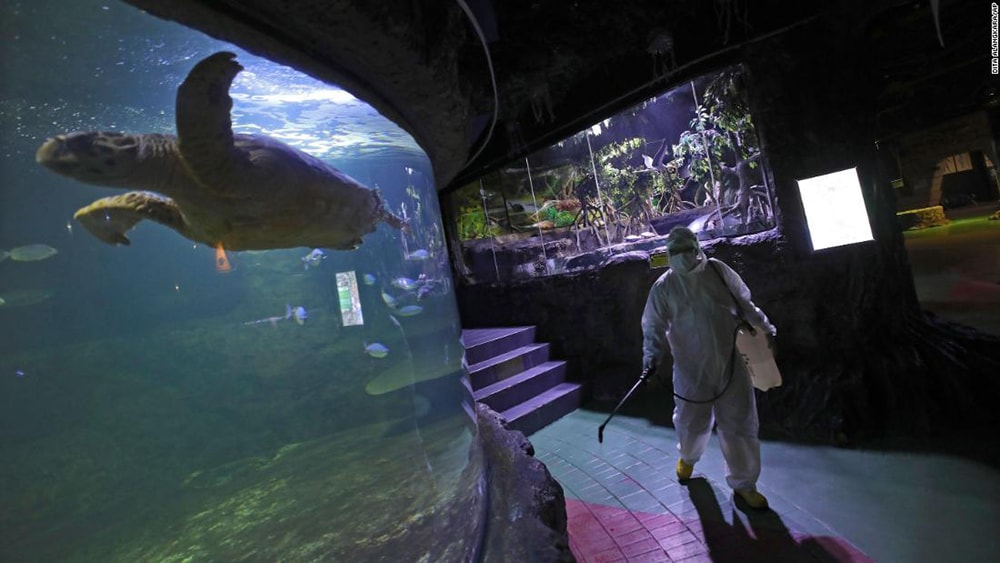Southeast Asia tightens siege against Covid-19 epidemic
(Baonghean) - Tens of millions of people in Southeast Asia are experiencing months of restrictions on travel, tourism, and even daily life. All of this is happening in the context of countries in this region preparing to respond to the possibility of a sudden increase in cases caused by the new strain of Corona virus.
Malaysia with strict control order
A source from the Bernama news agency also said that the control order in Malaysia - a country with a population of more than 31 million people, will start today (March 18) and last until the end of March, including a "comprehensive restriction on movement and public gatherings", including a ban on all religious, sports, social and cultural activities.
 |
| A resident walks out of the Seri Petaling Mosque in Kuala Lumpur, Malaysia on March 16. Photo: AP |
All churches and businesses will be closed, except supermarkets, wet markets, food stores and convenience stores that sell daily necessities. Most government offices, except those providing essential services such as water and electricity, will also be closed. Schools, universities and other educational institutions will be closed until the end of the month. “I urge everyone to always comply with the movement control order. It is our collective responsibility as citizens to care for our families, our society and our country,” said Prime Minister Muhyiddin.
Philippines self-imposed lockdown
Meanwhile, in the Philippines, half the country, or about 50 million people, are currently under an “enhanced community quarantine” in an effort to contain the spread of the new virus.
Luzon, the Philippines' largest and most populous island, home to the capital Manila, has been effectively locked down. All public transport has been suspended, and residents say they can only leave their homes to buy essential items.
 |
| Police measure the body temperature of passengers on a bus at a checkpoint in Manila, Philippines on March 16. Photo: AP |
Offices and headquarters have all been temporarily closed, and only supermarkets, convenience stores, hospitals, clinics, pharmacies, banks, as well as food delivery services and water pumping stations are allowed to remain open as usual. From midnight on March 17, local time, people have 72 hours to leave the island of Luzon if they want to, after which all flights to the island will be restricted. Specifically, apart from goods, only Filipino citizens, their spouses, children, permanent residents and those with diplomatic visas will continue to be allowed to enter Luzon.
To enforce the new measures, a massive 70,000-strong police force will be deployed across Luzon, and anyone found violating the quarantine will face arrest. According to CNN, video footage showed long lines of people lining up at customs checkpoints, with authorities checking their temperatures since the morning of March 16 after Manila was placed under community quarantine. According to the World Health Organization (WHO), the Philippines has recorded 140 cases of Covid-19 and 12 deaths.
Elsewhere in Southeast Asia, countries are also preparing to prevent widespread infections. Thailand's Deputy Prime Minister Wissanu Krea-ngam announced that the country's cabinet will meet to decide on measures to limit public gatherings, close schools, sports venues and Muay Thai boxing rings. These measures also include canceling the annual Songkran New Year water festival, which attracts millions of tourists each year to participate in crowded water fights, and many Thais return home for the New Year.
 |
| Measuring the body temperature of visitors to Wat Pho temple in Bangkok, Thailand on March 13. Photo: Getty |
The number of coronavirus cases in the country has jumped in recent days after months of slow growth. Thailand’s Ministry of Public Health reported 33 new cases on March 16, the highest number in a single day in the country, bringing the total to 143. Most of the new cases were among people who attended Muay Thai traditional martial arts events.
Fears of a second outbreak
The novel coronavirus has infected more than 181,500 people and killed 7,100 worldwide, according to Johns Hopkins University, which tracks cases published by the WHO and other sources. The continued acceleration in cases comes as countries around the world race to adopt emergency measures to try to contain the virus and enforce social distancing measures, including nationwide lockdowns, travel and customs restrictions, school closures, and orders for restaurants, cafes, and bars to close or limit their service.
Indeed, fears are growing in Asia about the possibility of a second wave of infections, fueled by imported cases. Countries such as China and South Korea have seen their case numbers stabilise in recent weeks, largely thanks to a combination of drastic containment and social distancing measures.
 |
| Disinfectant spraying at Marine Park in Jakarta, Indonesia on March 14. Photo: AP |
Tens of millions of people in mainland China and elsewhere in Asia are subject to various restrictions, keeping many from leaving their homes, going to work or going to school. But the rise in cases linked to travel abroad has raised concerns that all these sacrifices may be in vain. Governments across the region are now stepping up travel restrictions and quarantines, all with one goal in mind: to prevent a large-scale outbreak, and prevent the efforts that have been made so far from being in vain.
From March 16, all foreign visitors to the Chinese capital Beijing will have to undergo a 14-day quarantine at their own expense. Beijing authorities had previously required all passengers arriving from abroad to self-isolate, either at home or in a centralized quarantine facility, for two weeks. Hong Kong has urged its citizens to avoid all non-essential travel to Ireland, the UK and the US. In Singapore, authorities have announced a mandatory 14-day self-quarantine for new arrivals from several East Asian countries, Switzerland and the UK.
